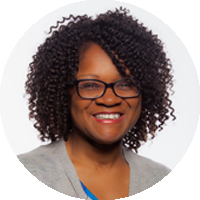
Whatever Stacye McCall does—whether it's volunteering for the YWCA, coaching her daughter's basketball team, or helping to implement diversity programs at the Federal Reserve Bank of Atlanta—she does it with passion.
McCall, staff director in the Bank's Office of Diversity and Inclusion, has played a pivotal role in changes the Atlanta Fed has made in recent years to become a more inclusive and equitable workplace.
She works with external vendors and consultants to design in-person and online diversity training for the Bank's 1,700 employees, including senior management, reviews the efforts of external suppliers to hire minorities and women, and consults with staff and groups across other Federal Reserve Banks on diversity and inclusion issues.

Stacye McCall. Photo by David Fine
"What we do in the Diversity office has an underlying effect on every single person in this Bank," McCall said. "My job is to continue to refresh the conversation until diversity and inclusion is part of the hard and soft wiring of the organization."
Chapelle Davis, the Atlanta Fed's vice president and chief diversity officer, said McCall's dependability and energy help the department execute its goal of creating a workplace culture that welcomes different points of view. "She's committed to the Fed and wants very much to see that we are a place where people feel included," Davis said.
McCall, a sports fan who played basketball while attending Stephen F. Austin State University in Texas, was focused on getting her present job from the moment it was posted, contacting the hiring managers early on and presenting a professional business case, including PowerPoint slides, during her 2011 interview.
Pouring her heart into her work while using her head
"What clearly came through was her intense passion for diversity," said Joan Buchanan, Atlanta Fed vice president and general auditor who was chief diversity officer when McCall was hired. "Sometimes people want a job because it's a promotion. She wanted the work because it's the role that her heart led her to."
That passion guides McCall's efforts to help others build bridges. She arranged a town hall chat on diversity and inclusion with Atlanta Fed president Raphael Bostic less than six months into his historic appointment as the first African American chief of a regional Reserve Bank. At that event, Bostic made clear his belief that considering diverse perspectives produces better decisions.
"She is not only a strong, vocal promoter and champion for the things we're already doing, but she also wants to push us to where she sees that we can go," said Karen Clayton, the Atlanta Fed's deputy diversity officer and Equal Employment Opportunity officer. For example, McCall helped the Human Resources Department identify unconscious bias training needs for the recruiting team, strongly advocating for more open conversations about diversity and inclusion topics and issues, Clayton said.
McCall admits her job has its challenges. It can take time for people to realize that D&I involves not only race and gender but also varied backgrounds, ideas, and mindsets. Talking about race, gender, and sexual orientation can be uncomfortable for many people, but McCall tends to lean in and engage in these courageous conversations. She's learned "how to approach these conversations differently for different audiences," she said. "Over the last nine years working in diversity and inclusion, I am getting much better at practicing patience and not allowing complacency to creep in while waiting on success."
One of the biggest successes she has been part of is the establishment of the Atlanta Fed's employee resource networks (ERN), employee-led groups formed around shared characteristics or professional interests. Once the ERN program was approved, McCall played a major role in helping these groups formulate their business cases and developing administrative procedures and communication strategies. Today, there are eight ERNs, focusing on interests such as cultural awareness, generational differences, and technology and innovation. At least a quarter of Atlanta Fed employees have joined at least one ERN. These efforts, along with McCall's overall body of D&I work, helped her earn the President's Award, the Bank's highest honor.
Retaining an appetite for learning
McCall's ability to value differences began early. She grew up in San Antonio, Texas, a diverse city with a large Hispanic population, and spent summers in Los Angeles, a melting pot of ethnic and cultural diversity. In addition, her mother taught Black history, and McCall was her research assistant, learning about not only Black history, but also how that history was an integral part of American history, with all its different cultures and ethnicities.
McCall has continued to deepen her knowledge around diversity. She earned the Certified Diversity Professional (CDP) designation and is an Intercultural Development Inventory (IDI)-qualified administrator. (The IDI is a tool that measures cultural awareness.) "Having these credentials was important to me, to balance my passion with the objective and clinical understanding of diversity and inclusion," said McCall. "I have finally found a place, a position where my passion aligns with my purpose, and it creates a space for me to bring my authentic self to the work I really enjoy."
McCall came to the Atlanta Fed in 2003 after successfully managing operations at restaurant and food service companies. But for the astuteness of a director named John Clark, her career at the Fed might have taken a different turn.
After earning an MBA, McCall applied for a part-time, third-shift job as a check coder at the Atlanta Fed's Jacksonville Branch to learn about banking. Clark, now a support services director, advised her to apply for a management position. McCall was hired as a supervisor in the Jacksonville Check operation. She eventually moved to the Atlanta headquarters and worked in the Check Function Office and Audit Department before taking her current role.
"She clearly was overqualified for the job she applied for," Clark said. "It would have been a missed opportunity for the organization if we didn't get her on the management team in a full-time capacity and take full advantage of her managerial and leadership skills."
The results of the work and collaboration with business partners that have garnered accolades outside the Bank. Just weeks ago, the Atlanta Fed earned a top score of 100 percent on the Human Rights Campaign Foundation's 2020 Corporate Equality Index, which assesses workplace policies for LGBTQ (lesbian, gay, bisexual, transgender, and queer) staff. The Bank is consistently included in the DiversityInc regional company ranking designating employers that excel in hiring and promoting women, minorities, veterans, and other underrepresented groups. "External validations are a huge value to students and applicants looking to join our organization as well as validation to our staff that we are upholding the Atlanta Fed's values of integrity, excellence, and respect," McCall said.
McCall also raises awareness of the Bank's diversity commitment through outreach. She currently chairs the nonprofit board of the Atlanta Diversity Manager Advocacy Group (ADMAG), which includes diversity and inclusion leaders from other Atlanta companies. She helps plan an annual citywide dialogue on race sponsored by the YWCA of Greater Atlanta that discusses topics such as privilege, inequality, and bias.
Sharmen Gowens, chief executive of the YWCA of Greater Atlanta, said McCall asks thought-provoking questions to facilitate conversation during the race discussions. "She has been instrumental in helping guide us and keep us current on issues that should be addressed," Gowens added.
Away from the office, McCall spends her time with her husband and son and daughter. Given her enthusiasm for sports, it is not surprising that her children play basketball. McCall coaches her daughter's team.
"As a former college athlete, I see how team sports and team dynamics can have an impact on how you see the world," McCall said. "Team sports force you to embrace diversity and inclusion early in life, and that is what we try and instill in our kids as they play sports."




